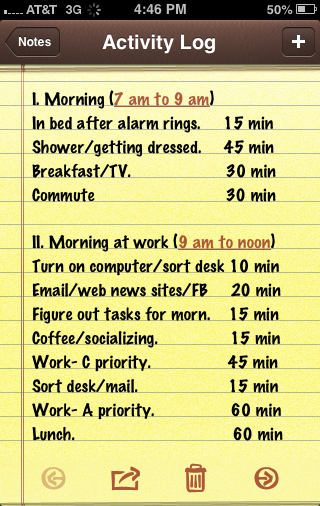Christian Counseling about How You Procrastinate (Part 1)
Benjamin Deu
By Benjamin Deu, MA, LMHC, Seattle Christian Counseling
 References: The Now Habit by Neil Fiore, Ph. D
References: The Now Habit by Neil Fiore, Ph. D
(This is the first article in a two-part series exploring why and how people procrastinate. This article focuses on helping you get a clearer picture of your areas of inefficiency. The second article focuses on understanding the emotions that motivate you to avoiding different tasks.)
Have you ever found yourself absorbed in a task like tidying your desk when you’re supposed to be polishing a presentation you have to give later that afternoon? You tell yourself it’s alright because tidying your desk is also on your to-do list, but another voice reminds you it’s not nearly as important as finishing the presentation. This is a type of procrastination. It just may not seem like it because you are being productive.
For people looking to conquer inefficiency, knowing how they waste time is crucial, says Neil Fiore, Ph. D., in his book The Now Habit. If you are not familiar with your negative habits, how can you ever fix them?
Activity Log
The first step to becoming more aware of how you procrastinate is by making a log of how you use your time. Create the log on something you can easily access, but won’t misplace. You can use a piece of paper, but it might be easier to create a document on your smartphone or iPad.
Do not change your activities. Log everything. The more honest you are about how you typically spend your time, the better equipped you are to identify your struggles with time management. Fiore recommends splitting the daily document into three or four time segments, such as morning, afternoon, and evening so you have an idea of when you are more productive.
“Alan Lakein, in How to Get Control of Your Time and Your Life, suggests using categories of most important (A), important (B), and least important (C). Certain “B” or “C” jobs, such as urgent tasks or committee work, can be used as a break from the more intense and usually more valuable “A priority” activities. This system of categories and priorities lets you know when you’re making progress on what’s really important and when you’re just putting out fires without making much progress.” (38)
Become more Productive
 As you analyze your activity log, think about how you would like to better use your time. Would you like to get more done at work, spend more time with loved ones, or make time for a hobby? Now that you have an idea of where your time normally goes, you can begin to redistribute it accordingly. Remember– do not beat yourself up if you see you are not doing eight hours of quality work a day. Much of contributing to the workplace involves “socializing, meetings, and communication to maintain a team approach and commitment to a common vision.” (42)
As you analyze your activity log, think about how you would like to better use your time. Would you like to get more done at work, spend more time with loved ones, or make time for a hobby? Now that you have an idea of where your time normally goes, you can begin to redistribute it accordingly. Remember– do not beat yourself up if you see you are not doing eight hours of quality work a day. Much of contributing to the workplace involves “socializing, meetings, and communication to maintain a team approach and commitment to a common vision.” (42)
However, if you are reading this article, it can be assured you have a problem making the best use of your time. Maybe you take your time settling in when you get to work. Or you may find yourself running late because you take the morning to do errands better suited for saving until the afternoon.
Fiore suggests tackling “A priority” work first thing at work, rather than wasting time socializing or straightening up your desk. A client he used as an example began exercising during her lunch hour, which left more time in the evenings for relaxing or socializing.
What the Bible says about Procrastination
Scripture exalts diligence and condemns idleness. “Go to the ant, you sluggard; consider its ways and be wise! It has no commander, no overseer or ruler, yet it stores its provisions in summer and gathers its food at harvest.” (Prov. 6:6-8 NIV) This verse may frighten guilty procrastinators. But take heart that God’s word also acknowledges human frailty, and rewards those who doggedly stumble their way toward Glory. “But he said to me, ‘My grace is sufficient for you, for my power is made perfect in weakness.’ Therefore I will boast all the more gladly about my weaknesses, so that Christ’s power may rest on me. That is why, for Christ’s sake, I delight in weaknesses, in insults, in hardships, in persecutions, in difficulties. For when I am weak, then I am strong.” (II Cor. 12:9-10 NIV)
Christian Counseling about Procrastination
Procrastination is not so much the result of sloth as it is poor planning and anxiety. You become overwhelmed by worrying what your performance on a project will say about you, and put it off until later. Or you may fail to create your schedule to make optimal use of your time. They can help you understand why you procrastinate, and direct you toward making better use of your time.
Photos
Christian-counseling-procrastination by Ellison Langford
Stop-procrastinating by Ellison Langford



